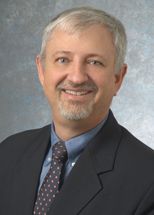Foam-like polymer/clay composite offers an array of potential applications, from packaging hazardous materials to possible oil-spill cleanup solution

Compadre, a company best known for transit packaging solutions, obtained an exclusive license to pursue commercial uses for AeroClay, an innovative technology developed in a Case Western Reserve University materials lab.
About two years ago, executives of Compadre, a privately held company based in Austin, Texas, became fascinated with the research of David Schiraldi, professor in macromolecular science and engineering. Schiraldi and his lab team developed AeroClay—the trademarked name for an array of lightweight, durable and environmentally friendly aerogel materials.
AeroClay technology uses freeze-drying and polymer additives to turn clay into a versatile material that is sturdy, malleable, heat- and flame-resistant, and eco-friendly. It can be used as an absorbent, insulator, packing material, industrial catalyst or even as an electrical conductor. The early work in the Schiraldi lab even found the potential for a better kitty litter.
The transformational license significantly advances the technology from its initial startup phase. AeroClay LLC will be a subsidiary of Compadre. The agreement allows AeroClay products to be marketed more quickly and efficiently, said Darryl Kelinske, chief executive officer at Compadre.
“Instinctively, we thought that this is something that can make a big difference,” Kelinske said. “Dave Schiraldi has done an incredible job of advancing the technology. Now we have to catch up with the marketplace and the supply chain.”
The key is to identify a market niche and provide a product that fills a need inexpensively, he said. One possible product, Kelinske said, could be a new type of packaging and protection for containers or devices containing hazardous materials by using a durable AeroClay material that also acts as a fire retardant. He and J. Gordon McGill, Compadre chief financial officer, said Compadre is eager to learn what new growth areas may exist now that the company is licensed to commercialize the AeroClay technology.
“What we bring to the table is a company that’s been around for 16 years,” Kelinske said. “The foundation is laid already. We will devote resources to commercializing a technology.”
Compadre was so impressed with AeroClay that the company hired Yuxin Wang, who recently earned a PhD from Case Western Reserve in macromolecular science and engineering, as its polymer engineer. She became expert in AeroClay through her work with Schiraldi in his lab.
“We’re equally excited,” Schiraldi said. “This is an opportunity to bring a technology platform into the marketplace where it can do some good, and we can do it with people who have a proven track record. It’s exactly what we should be doing with innovations.”
Although AeroClay will be part of Compadre in Austin, Schiraldi’s lab will have a role in the research and development of AeroClay products.
“This license agreement creates a wonderful model within our educational enterprise that allows us to show our undergraduate and graduate students how a dozen years of research is being transformed to commercial products,” Schiraldi said.
Michael Allan, senior licensing officer in the Office of Technology Transfer, said Compadre is the ideal commercialization partner.
“We’re very fortunate to engage with a company like Compadre, whom we feel strongly is best positioned to maximize the opportunities that the AeroClay technology enables,” Allan said. “The fact that the university has an equity ownership stake in the new AeroClay subsidiary affirms our partnership even more.”

